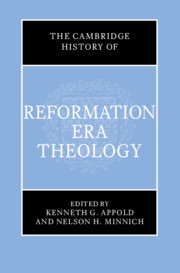Book contents
- The Cambridge History of Reformation-Era Theology
- The Cambridge History of Reformation-Era Theology
- Copyright page
- Contents
- Figures
- Acknowledgments
- Contributors
- Abbreviations
- Introduction
- Part One Theology in an Age of Cultural Transformation
- Part Two Schools and Emerging Cultures of Theology: Diversity and Conformity within Confessions
- 10 The Faculty of Theology of Paris (1474–1682)
- 11 The School of Salamanca
- 12 The Schools of Louvain and Douai: The Bible, Augustine, and Thomas
- 13 The Jesuit School of Theology
- 14 Theological Currents in Latin America (Sixteenth Century)
- 15 Diversity and Conformity within Early Lutheranism
- 16 Reformed Schools of Theology
- 17 Cultures of Theology in the British Isles
- 18 Radical and Dissenting Groups
- 19 Christian Ecumenical Efforts
- 20 Western “Confessions” and Eastern Christianity
- Part Three Topics and Disciplines of Theology
- Index
- References
10 - The Faculty of Theology of Paris (1474–1682)
from Part Two - Schools and Emerging Cultures of Theology: Diversity and Conformity within Confessions
Published online by Cambridge University Press: 27 September 2023
- The Cambridge History of Reformation-Era Theology
- The Cambridge History of Reformation-Era Theology
- Copyright page
- Contents
- Figures
- Acknowledgments
- Contributors
- Abbreviations
- Introduction
- Part One Theology in an Age of Cultural Transformation
- Part Two Schools and Emerging Cultures of Theology: Diversity and Conformity within Confessions
- 10 The Faculty of Theology of Paris (1474–1682)
- 11 The School of Salamanca
- 12 The Schools of Louvain and Douai: The Bible, Augustine, and Thomas
- 13 The Jesuit School of Theology
- 14 Theological Currents in Latin America (Sixteenth Century)
- 15 Diversity and Conformity within Early Lutheranism
- 16 Reformed Schools of Theology
- 17 Cultures of Theology in the British Isles
- 18 Radical and Dissenting Groups
- 19 Christian Ecumenical Efforts
- 20 Western “Confessions” and Eastern Christianity
- Part Three Topics and Disciplines of Theology
- Index
- References
Summary
The history of the faculty of theology of Paris1 cannot be separated from the history of the university as a whole, nor from other factors such as the city of Paris, its bishop, the pope, and the king. Its schools had an episcopal character, that is, they were associations of masters who were obliged to accept a chancellor as commissarius Papae. The pope allowed the schools to become a universitas, that is to say, he granted it the right to confer the licentia ubique docendi, and thus its degrees had universal authority.
- Type
- Chapter
- Information
- The Cambridge History of Reformation Era Theology , pp. 175 - 186Publisher: Cambridge University PressPrint publication year: 2023



